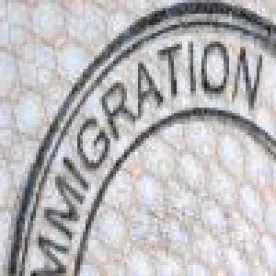On Oct. 6, 2020, the Department of Homeland Security (DHS) announced the Interim Final Rule (IFR), “Strengthening the H-1B Nonimmigrant Visa Classification Program.” This rule will be effective 60 days after publication in the Federal Register, with stakeholders given a 60-day comment period on the substance, then another 30-day comment period on new information collections proposed in the rule.
The rule largely focuses on “revamping” two large components of the H-1B program: 1) the definition of specialty occupation; and 2) third part worksites.
The term “specialty occupation” in the current regulations is defined in 8 C.F.R. 214.2: “Specialty occupation means an occupation which requires theoretical and practical application of a body of highly specialized knowledge in fields of human endeavor including, but not limited to, architecture, engineering, mathematics, physical sciences, social sciences, medicine and health, education, business specialties, accounting, law, theology, and the arts, and which requires the attainment of a bachelor’s degree or higher in a specific specialty, or its equivalent, as a minimum for entry into the occupation in the United States.” In addition, the criteria as currently listed are:
-
A baccalaureate or higher degree or its equivalent is normally the minimum requirement for entry into the particular position;
-
The degree requirement is common to the industry in parallel positions among similar organizations or, in the alternative, an employer may show that its particular position is so complex or unique that it can be performed only by an individual with a degree;
-
The employer normally requires a degree or its equivalent for the position; or
-
The nature of the specific duties are so specialized and complex that knowledge required to perform the duties is usually associated with the attainment of a baccalaureate or higher degree.
8 C.F.R. 214.2(h). In the IFR, DHS is dropping the words “usually” or “normally required,” or “common to the industry” and will require the petitioner to establish that a bachelor’s degree is a specific specialty or its equivalent is a minimum requirement for entry into the occupation by showing that this is ALWAYS the requirement for the occupation as a whole.
Another large area of proposed change is with Third Party Placements. There will be a new employer-employee relationship definition, as described below. In addition, if the H-1B beneficiary’s worksite is a third-party site, that will be a factor in determining whether an employer relationship with that beneficiary exists. Employers will also need to review carefully whether there is a co-employment issue with the third-party placement firm. Third-party sites will now be subject to site inspections.
Below is a summary of the proposed changes, by topic:
-
Site visits: USCIS may conduct on-site inspections and other compliance reviews any time after the filing of an H-1B petition. USCIS can also conduct a pre-approval inspection for an H-1B petition. The site inspection could be at the petitioner or the third-party worksite. Non-cooperation may result in the denial or revocation of the H-1B petition.
-
Employer-employee relationship: The petitioner must establish that the offer of employment is based on a valid employer-employee relationship. The following are all the factors USCIS will weigh:
-
Where the H-1B beneficiary does not have an ownership interest:
-
Whether the petitioner supervises the beneficiary, and where the supervision takes place;
-
If the supervision is not at the petitioner’s worksite, how the petitioner is able to maintain the supervision;
-
Whether the petitioner has the right to control the work of the beneficiary on a day-to-day basis and assign projects;
-
Petitioner provides the tools for the beneficiary to perform the duties;
-
The petitioner hires, pays, and can fire the beneficiary;
-
The petitioner evaluates the work product of the beneficiary;
-
The petitioner claims the beneficiary as an employee for tax purposes;
-
The petitioner provides employee benefits;
-
Beneficiary uses proprietary information of the petitioner to perform work;
-
Beneficiary produces an end product that is directly linked to the petitioner’s line of business;
-
The petitioner has the ability to control the manner and means the work is performed.
-
-
Where the H-1B beneficiary does have an ownership interest, there will be additional factors, including:
-
Hiring, firing, and rule setting for the beneficiary and its work;
-
Beneficiary reports to someone higher in the entity;
-
If the beneficiary is able to influence the entity;
-
Whether the contracts or agreements make it clear the beneficiary is an employee;
-
Whether the beneficiary shares in the profits, losses, and liabilities of the entity.
-
-
-
Specialty Occupation defined:
-
Theoretical and practical application of highly specialized knowledge in fields of human endeavor, and
-
The position requires a U.S. bachelor’s degree or higher in a directly related specific specialty. The studies must be directly related to the position, and the position is not considered specialty occupation if attainment of a general degree, such as business administration without a specialization, is sufficient. A position may allow a range of degrees, but each qualifying degree field must be directly related.
-
-
Criteria for specialty occupation- must satisfy at least one of the following:
-
U.S. bachelor’s degree or higher in a specific field is the minimum requirement for the position;
-
U.S. bachelor’s degree or higher in a specific field is the minimum requirement for entry into parallel positions at similar organizations in the industry;
-
Employer has a practice of requiring a U.S. bachelor’s degree or higher in a specific field for the petitioner. There must be proof that the job duties require such a degree;
-
Specific duties are so specialized, complex, or unique that they can only be performed by one with a U.S. bachelor’s degree or higher in the specific field.
-
-
Demonstrating sufficient work
-
Petitioner must demonstrate there is sufficient work for the H-1B duration requested;
-
If a third-party worksite, the petitioner must submit contracts, work orders, or other evidence that there is 1) sufficient specialty occupation work, and 2) a valid employer/employee relationship.
-
-
Maximum validity period requested on an H-1B petition: three years for H-1B; one year for third-party worksite.
Redefined terms:
-
Third-party worksite: A worksite that is not the beneficiary’s residence in the U.S. that is not owned or leased, and not operated by the petitioner.
-
U.S. Employer: Engages the beneficiary to work; has an employer-employee relationship; has an IRS FEIN.
-
Worksite: Physical location where the work is actually performed. Each location must be on the LCA.



 />i
/>i

